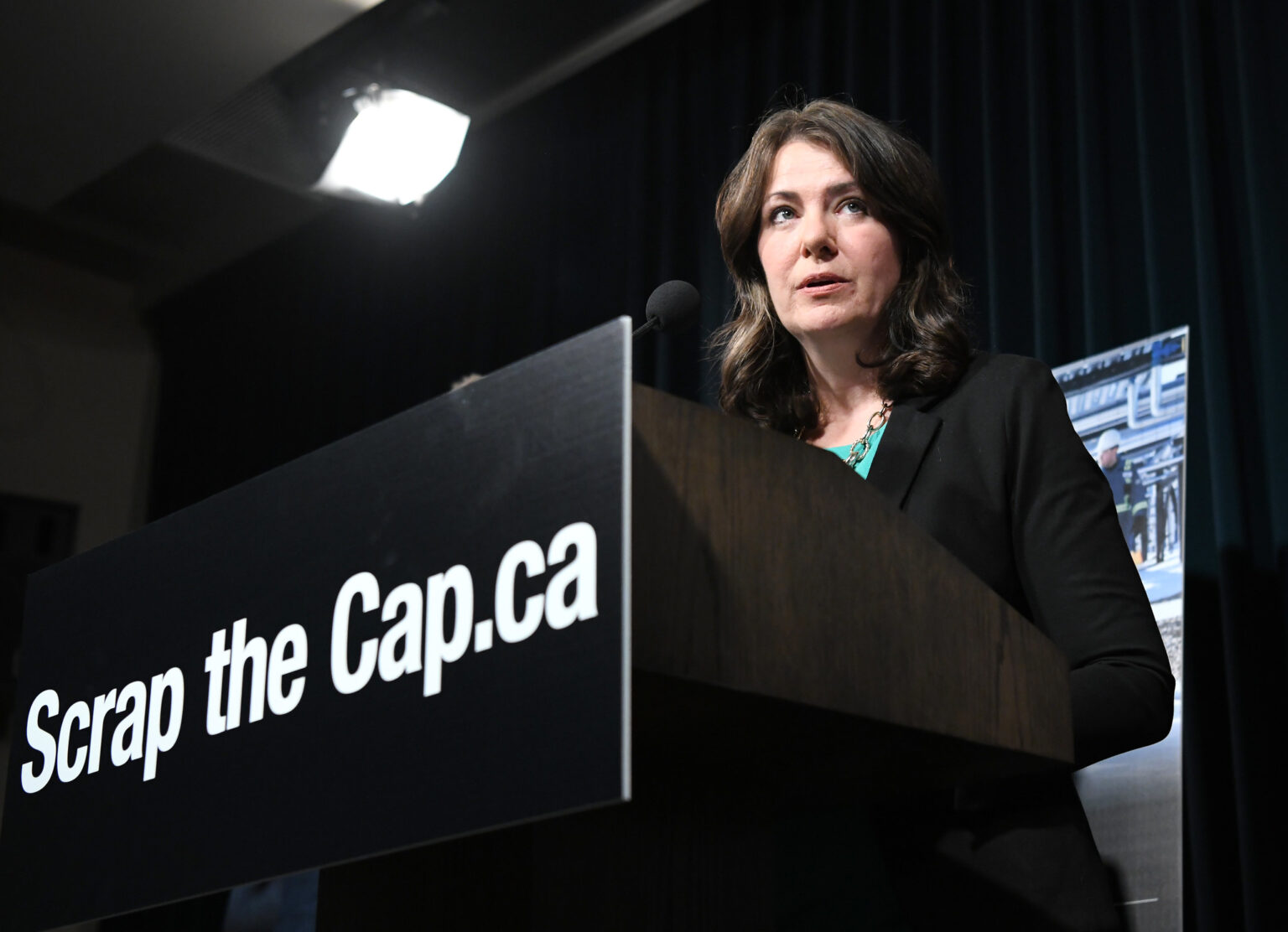The Alberta government just launched a $7 million ad campaign against the proposed federal emissions cap. Newspapers from Edmonton to Halifax featured a front page wrap warning Canadians across the country that capping emissions from the oil sands could take hard-earned money directly from the pocketbooks of taxpayers.
The stark black-and-white Scrap the Cap website warns in doomsday font, “a production cap will make groceries, gas and all of life’s necessities even more expensive… A production cap will cause thousands of job losses and will mean billions less in taxes that could have been used to build roads, schools and hospitals.”
Subscribe to our newsletter
Stay up to date with DeSmog news and alerts
But the federal government is not proposing a production cap – they are proposing an emissions cap. Until the Pathways Alliance abruptly scrubbed much of their website in July 2024, the largest oil sands companies were assuring Canadians that their $16.5 billion carbon capture and storage plan – largely paid for by the Canadian taxpayer – would reduce emissions enough to meet the new rules.
That is unless CCS is too expensive and unreliable to work, as was detailed in a recent report by Deloitte commissioned by the Alberta government. The authors found that implementing the multi-billion-dollar carbon injection scheme would make most oil sands operations uneconomic, stating plainly, “We do not foresee any oil sands CCS investments being implemented.”
‘It’s a Deception’
DeSmog applauds any effort to defend Canadian pocketbooks, especially in a sector that has plowed billions in record breaking profits into shareholder buybacks, stock dividends and executive compensation – all while refusing to pay more than $250 million in outstanding municipal taxes to rural Albertan towns.
The oil patch is also the seemingly ungrateful beneficiary of the new $35 billion Trans Mountain pipeline expansion paid for by the Canadian taxpayer. The tolls on this are so low that even if Ottawa managed to find a private sector buyer for this boondoggle, the public would still be out-of-pocket over $18 billion. This could be remedied through a modest export levy on western crude, but what federal government would dare side with taxpayers rather than the oil patch?
And on the important subject of lessening the burden on Canadian families, perhaps Alberta should start by eliminating towering unsecured liabilities from abandoned well sites and pipelines, estimated by the Auditor General to top $60 billion. The Government of Alberta has collected only $295 million as a security, or less than 0.5 percent.
Put another way, the Alberta government has allowed each Alberta household to be on the hook for over $36,000 in unfunded wellsite and pipeline liabilities racked up by an exceedingly profitable industrial sector. If you also include $57 billion in unfunded bitumen mine liabilities, the tab for every Alberta home currently exceeds $70,000 per Albertan home.
These unfunded liabilities grow larger each year because Alberta – unlike almost every U.S. state – has no mandatory timelines for wellsite cleanup. Meanwhile the expanding problem of tailings ponds worsens annually as there is no credible plan to safely dispose of more than 1.4 trillion litres of toxic slurry now impounded behind leaky earthen dams. Oil sands mining companies also have no requirement to pony up additional financial security until fifteen years before projected closure.
“The whole point of a security regime is to have money set aside when the economics are bad,” Martin Olszynski, a law professor at University of Calgary told DeSmog. He feels that allowing companies to delay meaningful deposits into Alberta’s Mine Financial Security Program (MFSP) until they are in financial distress “makes no sense whatsoever. it’s nonfunctional…It’s essentially like not having a security regime.” For these reasons Olszynski characterized the MFSP as, “essentially a fraud. It’s a deception. It’s smoke and mirrors.”
Scrap the Crap, Please
How could an organization that calls itself the Alberta Energy Regulator (AER) have allowed this to happen? Since its inception in 2013, the AER has been 100 percent funded – not by the public – but by the industry it purports to oversee.
This blurry line between companies and regulators is reflected in the latest ad campaign by the Alberta government, which follows a familiar playbook: blame Ottawa, frame all climate-related policy as a pocketbook issue, and collect personal data from an online petition.
As for government-funded fear mongering of up to 150,000 job losses, that dubious figure is larger than the entire labour force currently employed by the Alberta upstream energy sector.
Rather than blaming an Ottawa bogey man for killing oil patch jobs decades from now, consider instead how oil companies managed to eliminate 45,000 permanent oil patch jobs in the last ten years while production ballooned by over 40 percent. That trend is projected to continue in the future with 50,000 additional jobs lost to automation by 2040 while bitumen production ramps up by 35 percent in a business-as-usual scenario.
If proxies for the oil patch like the current Alberta government are so worried about legitimate concerns regarding the cost-of-living burden on everyday Canadians they should start by ensuring that every Albertan household is not needlessly on the hook for oil industry liabilities that could otherwise pay for a new 2025 pickup truck and leave $10,000 to pay down the mortgage. Scrap the Cap? How about “scrap the crap.”
Subscribe to our newsletter
Stay up to date with DeSmog news and alerts







